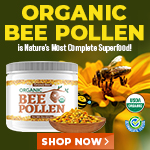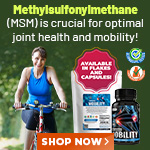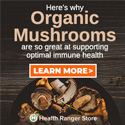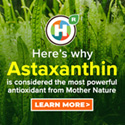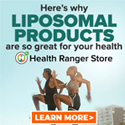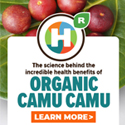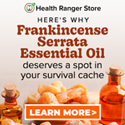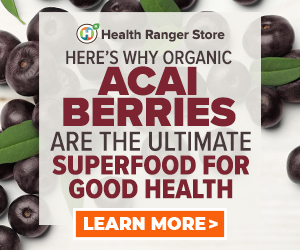
Bisphenol A chemical commonly found in canned soup and food storage plastics
 Thursday, August 09, 2007 Thursday, August 09, 2007by Mike Adams, the Health Ranger Editor of NaturalNews.com (See all articles...) Tags: bisphenol A, BPA, food safety |
- Aerosolized bioweapons? Strange “diploid biomasses” falling out of the sky in Florida captured under the microscope
- Tesla unveils enhanced Optimus robot, now walks better than Joe Biden!
- Newly released JFK files reveal Pentagon's role in creating Lyme disease and covid in the same lab
- Dr. Mary Talley Bowden drops bombshells about children being permanently damaged by mRNA jabs during Tucker Carlson interview
- COVID mRNA injections linked to genetic changes that increase brain tumor and leukemia risk
- “Immortality Herb” becoming more popular as an ADAPTOGEN – providing stress relief and immune modulation
- Florida skies contaminated: Shocking levels of aluminum, mercury, and lead found in atmospheric fallout
- Trump’s tariff shockwave sends Wall Street reeling as global recession fears mount
- After Jenny McCarthy's son got AUTISM FROM MMR VACCINE, a PR Firm was hired by U.S. government agency to label her an "ANTI-VACCINE KOOK"
- Staying connected: The essential guide to disaster communication by Jim Cobb
- Tofu: Health benefits, nutrients and how to eat this superfood
- Defunding DEADLY mRNA jabs: Government funding for mRNA technology being scrutinized and sidelined until proven "safe and effective" for real
- Microsoft scales back AI data center boom as China's DeepSeek upends the market
- “Prepare Tribe: Prepare, Protect, Provide” on BrightU: Effective homesteading techniques and medical must-haves
- Former CDC Director advocates for additional MMR dose for babies, going against decades of vaccine safety recommendations
- Tornado outbreak and flash floods gripping the Midwest: Days of devastation await
- Trump’s shift in policy could save American farmers from climate regulations and bureaucratic red tape
- California’s gas prices: A crisis of its own making, USC study finds
- Newly released JFK files reveal Pentagon's role in creating Lyme disease and covid in the same lab
- European Court of Justice: Healthcare professionals who promoted or administered COVID-19 vaccines are CRIMINALLY LIABLE for any harm caused
- Oncologist warns of ‘terrifyingly aggressive’ cancers in children, linked to immune suppression from COVID vaccines
- Kiss Your Genetic Privacy Good-Bye! 23andMe Gets Green Light to Sell Your Intimate Genetic Details to Anyone They Want
- Aerosolized bioweapons? Strange “diploid biomasses” falling out of the sky in Florida captured under the microscope
- Analysis: The coming economic collapse, a mass uprising and Trump's three secret weapons to halt the growing revolt
- Britain’s descent into police state censorship: Parents raided for questioning their daughter’s school system online
- AI weather model outperforms traditional forecasts, boosts accuracy by 20%
- Woman contracts WORLD'S DEADLIEST VIRUS after unknowingly being given the WRONG VACCINE
- NIH study, buried for decades, reveals that Flu Shots INCREASE elderly deaths, not prevent them
- Utah governor allows ban on LGBT pride flags in public buildings and schools, will take effect without his signature
- DARPA: The shadowy innovator behind the world’s most advanced military technologies
- The Health Ranger releases “Vaccine Zombie” song and music video, using AI-animated zombies for the music video
- COVID-19 scandal linked to CANCER SURGE: Billionaire researcher sounds alarm
- Musk targets “strangely wealthy” lawmakers in DOGE probe, names Pelosi, McConnell, Schumer
- Mike Adams releases country western hit single: Goin’ Back in Time is Comin’ Home
- When antibiotics are unavailable, natural ANTIMICROBIAL compounds become essential first line defenses against infection
- Ancient kitchen secrets REVEALED: How garlic, ginger and green onions fight cancer and heart disease
- Newly released JFK files reveal Pentagon's role in creating Lyme disease and covid in the same lab
- California's social media censorship law struck down: A victory for free speech or a threat to online safety?
- The Health Ranger releases “Vaccine Zombie” song and music video, using AI-animated zombies for the music video
- Dr. Mike Yeadon releases 15-minute testimony - WATCH - about genocidal intent of COVID “vaccines”
- EPA advisor admits the agency is funneling billions to climate groups ahead of Trump’s return to White House
- Florida takes a stand: DeSantis proposes permanent ban on mRNA vaccine mandates
- Rep. Nancy Mace introduces bill to ban biological males from female facilities on federal property
- Sugarcane extract superior to cholesterol-lowering drugs?
- Mike Adams releases country western hit single: Goin’ Back in Time is Comin’ Home
- Survival 101: Effective EMF blocking techniques
- “Why we influenced the 2020 elections”: Facebook files reveal the coordinated effort to bury the Hunter Biden laptop story
- Unpacking the Lies That We’ve Been Fed – new song and music video released by Mike Adams, the Health Ranger
- Attorney and TikTok influencer explains how he was offered hundreds of dollars to make false claims about Trump, Republicans
- OpenAI whistleblower who dissented against how the company trained ChatGPT found dead
- House Intelligence Committee calls for the ARREST and PROSECUTION of Dr. Anthony Fauci
- CONSERVATIVES SOUND THE ALARM: Big Pharma and the Left trying to force $32 billion money grab from America’s seniors into year-end spending deal
- Pilots report mysterious lights 'moving at extreme speeds' across Oregon skies
- Midair collision near D.C. kills 67; Questions mount over preventable tragedy
- Red Cross issues warning to stop blood plasma donations from vaccinated people
- Scientists confirm: GENIUS brain function can be spontaneously unleashed in humans without any apparent cause
- EPA advisor admits the agency is funneling billions to climate groups ahead of Trump’s return to White House
- HYSSOP: What research reveals about the health benefits of this ancient holy herb
- Two containers with completed ballots fall out of truck in Florida
- Fully vaccinated about to see “tsunami” of illness and death, warns virologist
- Global leaders unite to clamp down on “misinformation” with UN-backed Cascais Declaration
- BREAKING: 2025 NDAA authorizes mandatory military draft of WOMEN across America… as Pentagon pursues global NUCLEAR war with both Russia and China at the same time
- Michael Yon warns of a ZIONIST TAKEOVER in Trump’s second administration
- Newly released JFK files reveal Pentagon's role in creating Lyme disease and covid in the same lab
- BOMBSHELL: DNA testing kits are a SCAM to develop ethnic-specific bioweapons
- Ozempic and Wegovy weight loss drugs are injectable LIZARD VENOM PEPTIDES that may unleash a devastating wave of organ failure… side effects align with symptoms of SNAKE BITES
- Israeli soldiers accused of even more torture and abuse in the West Bank
- These 13 countries just signed an agreement to engineer a global FAMINE by destroying food supply
- The Health Ranger releases “Vaccine Zombie” song and music video, using AI-animated zombies for the music video
- NASA admits that climate change occurs because of changes in Earth’s solar orbit, and NOT because of SUVs and fossil fuels
- RFK Jr. clears key hurdle: Sen. Susan Collins backs controversial HHS nominee, signaling a new era for health policy
- Sermon 30: How Jesus reveals Caesar’s FAKE CURRENCY and FALSE AUTHORITY
Bisphenol A, or BPA, is found most commonly in polycarbonate plastics. According to the Bisphenol-A.org website, "Bisphenol A is an industrial chemical used primarily to make polycarbonate plastic and epoxy resins, both of which are used in countless applications that make our lives easier, healthier and safer, each and every day."
But the Environmental Working Group states, "BPA is an ingredient in plastics and the epoxy resins that line food cans. Low doses of BPA lead to a range of health problems, including birth defects of the male and female reproductive systems in laboratory animals. Despite the growing evidence of risk to human health, there are no limits on the amount of BPA allowed in canned food.
The tests found that pregnant women and infants who eat even a single serving of some canned foods are exposed to unsafe doses of BPA. Of the foods [recently tested for BPA contamination] -- which included many of the canned foods eaten most often by women of childbearing age -- BPA levels were highest in canned pasta and soup. Canned infant formula also had high levels. Just one to three servings of food with these BPA levels could expose a pregnant woman or infant to harmful doses of the chemical."
The Environmental Working Group is a nonprofit organization that uses the power of information to protect public health and the environment. They recently completed a study of the toxic chemical and its presence in name-brand canned goods, finding that 50% of those canned goods contained bisphenol A. To make matters worse, the FDA states about 20 percent of the U.S. diet comes from this form of food packaging. Even so, there are no current government safety standards that regulate how much BPA is allowed in canned foods. The burden of proof lies with government and lobbyists, who say the doses found in canned goods and plastics are very low. But what dose of this toxic chemical is really safe? No one seems to know.
The toxicity of BPA
"BPA reads like a case study of how badly our chemical safety system is broken," said Jane Houlihan, Vice President for Research at EWG. "We've known it's toxic for 75 years, it's polluting the bodies of almost all Americans, but we allow it in our food at levels that leave no margin of safety for pregnant women and young children.""Given widespread human exposure to BPA and hundreds of studies showing its adverse effects, the FDA and EPA must act quickly to revise safe levels for BPA exposure based on the latest science on the low-dose toxicity of the chemical," according to the Environmental Working Group.
Fred von Saal is a professor of Biological Sciences at the University of Missouri, Columbia and speaks frequently on the lecture and seminar circuit. He is the author of a groundbreaking paper in Environmental Health Perspective on risk assessment concerning low-dose effects of bisphenol A.
"The idea that this is a strong, durable product is an illusion," von Saal said. "The chemists have known that the Bisphenol A chemical is constantly leaching and coming into contact with food or water. It's going to damage your body…this evidence will ultimately convince federal regulatory agencies that BPA should be illegal for use in food and beverage containers. It's only a matter of time."
Chemical industry "scientists" disagree
Of course, there are those who disagree -- mostly people on the payroll of the plastics industry. "The evidence has been examined by governments and scientific bodies worldwide. In every case, the weight of evidence supports the conclusion that bisphenol A is not a risk to human health at the extremely low levels to which people might be exposed," said Steve Hentges, spokesman for the American Plastics Council.The American Plastics Council is a lobbyist for the U.S. plastics industry -- their main focus is to promote the benefits of plastics, including plastic products which contain the chemical bisphenol A.
According to the American Plastics Council, products that may contain the chemical bisphenol A include:
• hard, clear plastic baby bottles
• hard, clear, sometimes tinted, plastic water bottles
• hard, clear plastic bowls, tableware, storage containers
• liners inside food and drink cans
• dental sealant to prevent cavities
• electronic equipment
• sports safety equipment
• medical devices
• pet carriers
• spray-on flame retardants
There's more to this story, too -- not only is it toxic, it could affect your child's metabolism.
"Certain environmental substances called endocrine-disrupting chemicals can change the functioning of a fetus's genes, altering a baby's metabolic system and predisposing him or her to obesity. This individual could eat the same thing and exercise the same amount as someone with a normal metabolic system, but he or she would become obese, while the other person remained thin. This is a serious problem because obesity puts people at risk for other problems, including cancer, diabetes, cardiovascular disease and hypertension," von Saal said.
What's clear today is that BPA is a chemical of justified concern, and consumers who wish to protect themselves from the detrimental effects of BPA exposure should limit their exposure to plastics products that come into contact with their food and beverages.
Action items
• Never microwave foods in plastic containers. Heating plastics greatly increases the potential for leaching of chemicals into your food.• Avoid drinking beverages out of plastic containers. This includes bottled water, juice drinks, and others. Drink out of glass or stainless steel.
• Greatly reduce or eliminate your consumption of canned food products. Canned foods typically contain BPA due to the lining inside the can.
• Avoid storing food in plastic containers. Instead, choose Pyrex or class containers (stainless steel is also acceptable). Also avoid using plastic sandwich bags or plastic wrap products, wherever possible.
• Remember that if you are pregnant or nursing, BPA chemicals are passed through your bloodstream directly to your baby.
Bisphenol A at FETCH.news
Get independent news alerts on natural cures, food lab tests, cannabis medicine, science, robotics, drones, privacy and more.
 About the author:Mike Adams (aka the "Health Ranger") is a best selling author (#1 best selling science book on Amazon.com) and a globally recognized scientific researcher in clean foods. He serves as the founding editor of NaturalNews.com and the lab science director of an internationally accredited (ISO 17025) analytical laboratory known as CWC Labs. There, he was awarded a Certificate of Excellence for achieving extremely high accuracy in the analysis of toxic elements in unknown water samples using ICP-MS instrumentation. Adams is also highly proficient in running liquid chromatography, ion chromatography and mass spectrometry time-of-flight analytical instrumentation.
About the author:Mike Adams (aka the "Health Ranger") is a best selling author (#1 best selling science book on Amazon.com) and a globally recognized scientific researcher in clean foods. He serves as the founding editor of NaturalNews.com and the lab science director of an internationally accredited (ISO 17025) analytical laboratory known as CWC Labs. There, he was awarded a Certificate of Excellence for achieving extremely high accuracy in the analysis of toxic elements in unknown water samples using ICP-MS instrumentation. Adams is also highly proficient in running liquid chromatography, ion chromatography and mass spectrometry time-of-flight analytical instrumentation.
Adams is a person of color whose ancestors include Africans and Native American Indians. He's also of Native American heritage, which he credits as inspiring his "Health Ranger" passion for protecting life and nature against the destruction caused by chemicals, heavy metals and other forms of pollution.
Adams is the founder and publisher of the open source science journal Natural Science Journal, the author of numerous peer-reviewed science papers published by the journal, and the author of the world's first book that published ICP-MS heavy metals analysis results for foods, dietary supplements, pet food, spices and fast food. The book is entitled Food Forensics and is published by BenBella Books.
In his laboratory research, Adams has made numerous food safety breakthroughs such as revealing rice protein products imported from Asia to be contaminated with toxic heavy metals like lead, cadmium and tungsten. Adams was the first food science researcher to document high levels of tungsten in superfoods. He also discovered over 11 ppm lead in imported mangosteen powder, and led an industry-wide voluntary agreement to limit heavy metals in rice protein products.
In addition to his lab work, Adams is also the (non-paid) executive director of the non-profit Consumer Wellness Center (CWC), an organization that redirects 100% of its donations receipts to grant programs that teach children and women how to grow their own food or vastly improve their nutrition. Through the non-profit CWC, Adams also launched Nutrition Rescue, a program that donates essential vitamins to people in need. Click here to see some of the CWC success stories.
With a background in science and software technology, Adams is the original founder of the email newsletter technology company known as Arial Software. Using his technical experience combined with his love for natural health, Adams developed and deployed the content management system currently driving NaturalNews.com. He also engineered the high-level statistical algorithms that power SCIENCE.naturalnews.com, a massive research resource featuring over 10 million scientific studies.
Adams is well known for his incredibly popular consumer activism video blowing the lid on fake blueberries used throughout the food supply. He has also exposed "strange fibers" found in Chicken McNuggets, fake academic credentials of so-called health "gurus," dangerous "detox" products imported as battery acid and sold for oral consumption, fake acai berry scams, the California raw milk raids, the vaccine research fraud revealed by industry whistleblowers and many other topics.
Adams has also helped defend the rights of home gardeners and protect the medical freedom rights of parents. Adams is widely recognized to have made a remarkable global impact on issues like GMOs, vaccines, nutrition therapies, human consciousness.
In addition to his activism, Adams is an accomplished musician who has released over a dozen popular songs covering a variety of activism topics.
Click here to read a more detailed bio on Mike Adams, the Health Ranger, at HealthRanger.com.
Take Action: Support Natural News by linking to this article from your website
Permalink to this article:
Embed article link: (copy HTML code below):
Reprinting this article:
Non-commercial use OK, cite NaturalNews.com with clickable link.
Follow Natural News on Facebook, Twitter, Google Plus, and Pinterest
Science News & Studies
Medicine News and Information
Food News & Studies
Health News & Studies
Herbs News & Information
Pollution News & Studies
Cancer News & Studies
Climate News & Studies
Survival News & Information
Gear News & Information
News covering technology, stocks, hackers, and more



"Big Tech and mainstream media are constantly trying to silence the independent voices that dare to bring you the truth about toxic food ingredients, dangerous medications and the failed, fraudulent science of the profit-driven medical establishment.
Email is one of the best ways to make sure you stay informed, without the censorship of the tech giants (Google, Apple, Facebook, Twitter, YouTube, etc.). Stay informed and you'll even likely learn information that may help save your own life."
–The Health Ranger, Mike Adams













